6 Sep 2013 | News and features, Russia
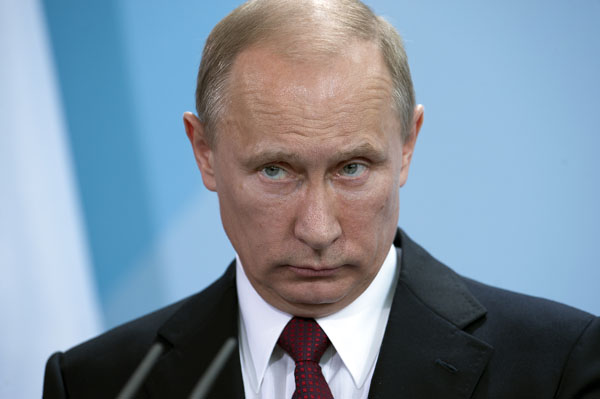
Image Gonçalo Silva/Demotix
Russian president Vladimir Putin hit the headlines around the world after an interview with the Russian First Channel and the Associated Press on 4 September. His statements on Syria were given much attention, with early reports saying it meant Russia might support military intervention. In fact, Putin did not state that clearly, but pegged it to “conclusive evidence of the use of chemical weapons” by the Assad regime.
Close consideration of Putin’s recent public statements shows the same approach applied to other topics, including several human rights issues that Russia has been criticised about lately. Despite a noticeable change of the tone he prefers to give vague comments rather than well-articulated attitudes.
For instance, his reply to criticism on the law that bans “homosexual propaganda” was aimed to show Putin is tolerant to representatives of LGBT community, all the while referring to them as “such people”.
“I work with such people; sometimes I award them with medals and orders, we have absolutely normal relations, and I see nothing special about it,” said Putin in the interview without going into details on who “such people” are and what kind of “work” with Russia’s president they are involved in.
The same seemingly pleasant, but otherwise void impression was given by Putin during his meeting with a presidential Council on Development of Civil Society and Human Rights. During the meeting on 4 September Vladimir Putin put aside his macho-style image of a firm ruler.
“He suddenly appeared to be a different person, a constructive and attentive politician who is open to ideas and ready to consider them,” Andrey Yurov, a Russian human rights defender who is a member of the Council told Index. “He was listening carefully to suggestions about reforming of penal and judiciary systems, adjustments to internet regulations and public control of the state bodies, and reacted with comments like ‘Oh, this is interesting’, ‘We really need to look into that’ or ‘We might need to create a working group on this’. He did not say ‘yes, we will definitely do it’ to any of our suggestions, but at least he did not say a firm ‘no, we won’t do it’ to anything.”
Vladimir Putin even admitted the notorious NGO “foreign agents” law might need to be re-assessed. The law, adopted a year ago, forced all non-governmental organisations that receive funds from abroad to register as “foreign agents” if they are involved in “political activities”. The problem with the law, as many experts and civil society groups have pointed out, is its extremely broad definition of what constitutes a political activity. During the meeting with human rights defenders President Putin said it might be re-defined and narrowed.
“It is difficult to say if it marks a reboot of an attitude of the state towards the civil society and whether any real steps are to follow. But it was a constructive conversation between a rational politician and civil society. Perhaps it has to do with the G20 summit in St. Petersburg; Putin needs to show he is an open leader and he is in touch with civil society of his country,” recons Andrey Yurov.
Yury Dzibladze, the president of the Centre for the Development of Democracy and Human Rights, does not believe Putin’s statement signal any change.
“There are no signs of real improvement of the situation with human rights and civic freedoms inside the country. Criminal cases against political opponents are on-going; inspections of NGOs in line with the ‘foreign agents’ law continue. The rhetoric might change, but it only means the authorities want to improve their image abroad, not alter the situation in Russia itself. It might be connected with the G20 summit and up-coming winter Olympics they do not want foreign politicians to boycott,” said Yuri Dzhibladze.
5 Sep 2013 | Africa, Europe and Central Asia, France, Italy, News and features, Russia, South Africa, United States
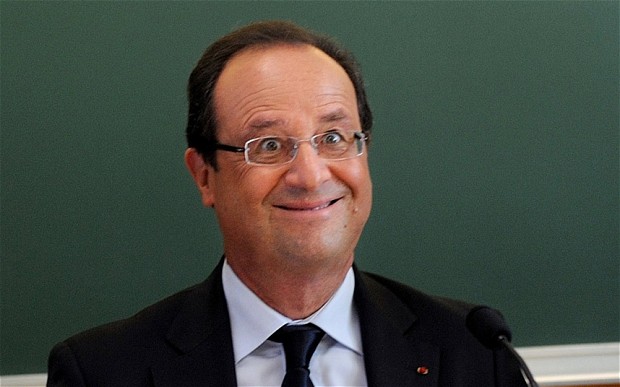 French news agency AFP has been caught up in a self-censorship row after attempting to retract a photo of President Francois Hollande flashing a gormless smile. The whole debacle has gone viral, forcing AFP to make a statement denying they had caved to government pressure. Rather, they cited internal editorial guidelines ‘not to transmit images that gratuitously ridicule people.’ However, politicians are not strangers to banning (or trying to ban!) images that makes them look a bit silly.
French news agency AFP has been caught up in a self-censorship row after attempting to retract a photo of President Francois Hollande flashing a gormless smile. The whole debacle has gone viral, forcing AFP to make a statement denying they had caved to government pressure. Rather, they cited internal editorial guidelines ‘not to transmit images that gratuitously ridicule people.’ However, politicians are not strangers to banning (or trying to ban!) images that makes them look a bit silly.
 You’d think that Vladimir Putin, used to being in the public eye, captured in completely random and non-staged situations like this, wouldn’t mind being the inspiration for some fine art. That turned out not to be the case when a St Petersburg gallery exhibited a painting of Putin and PM Dmitry Medvedev – the former sporting a fetching pink negligee, the latter a black lace push-up bra. Russian police raised the gallery and removed the picture in question, as well as three others depicting Russian political leaders. The reason given was that the imagines ‘violate existing legislation’.
You’d think that Vladimir Putin, used to being in the public eye, captured in completely random and non-staged situations like this, wouldn’t mind being the inspiration for some fine art. That turned out not to be the case when a St Petersburg gallery exhibited a painting of Putin and PM Dmitry Medvedev – the former sporting a fetching pink negligee, the latter a black lace push-up bra. Russian police raised the gallery and removed the picture in question, as well as three others depicting Russian political leaders. The reason given was that the imagines ‘violate existing legislation’.
 Back in 2009, artist Conor Casby painted two pictures of former Irish taoiseach Brian Cowen sitting on a toilet naked. He then hung them on the walls of the National Gallery and the Royal Hibernian Gallery in Dublin, and broadcaster RTE made a short piece about it. The outcome? RTE had to issue a formal apology and remove the item from its online archive. Meanwhile, the police launched a country wide manhunt for Casby. He had to hand over five more paintings to the police and faced potential charges of indecency, criminal damage and incitement to hatred. All for making a politician the butt of his joke.
Back in 2009, artist Conor Casby painted two pictures of former Irish taoiseach Brian Cowen sitting on a toilet naked. He then hung them on the walls of the National Gallery and the Royal Hibernian Gallery in Dublin, and broadcaster RTE made a short piece about it. The outcome? RTE had to issue a formal apology and remove the item from its online archive. Meanwhile, the police launched a country wide manhunt for Casby. He had to hand over five more paintings to the police and faced potential charges of indecency, criminal damage and incitement to hatred. All for making a politician the butt of his joke.
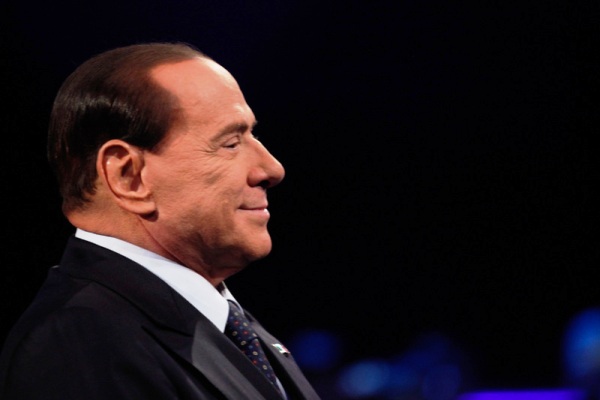 In 2002, former Italian Prime Minister Silvio Berlusconi was accused of censoring a play putting him and his compatriots in an unfavorable light. Renowned theatre director Luca Ronconi used caricature pictures of Berlusconi and two other ministers as props in his production of Greek comedy “The Frogs.” Ronconi said officials from ruling party Forza Italia tried to make him remove the pictures from stage. Berlusconi, on the other hand, stated that while the pictures ‘didn’t please him’: ‘The government, the whole government, doesn’t even know what censorship is.’
In 2002, former Italian Prime Minister Silvio Berlusconi was accused of censoring a play putting him and his compatriots in an unfavorable light. Renowned theatre director Luca Ronconi used caricature pictures of Berlusconi and two other ministers as props in his production of Greek comedy “The Frogs.” Ronconi said officials from ruling party Forza Italia tried to make him remove the pictures from stage. Berlusconi, on the other hand, stated that while the pictures ‘didn’t please him’: ‘The government, the whole government, doesn’t even know what censorship is.’
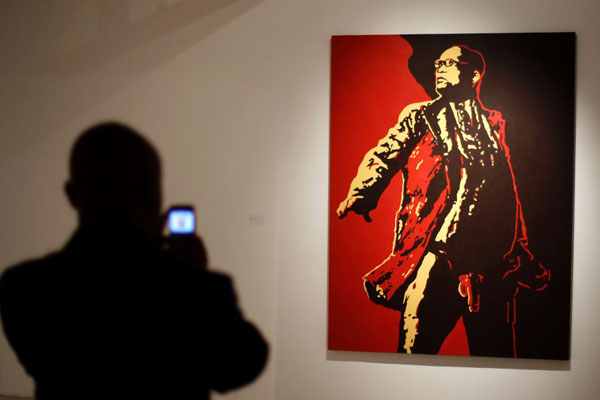 South African President Jacob Zuma caused quite a stir when he demanded that a painting of him be removed from Johannesburg’s Goodman Gallery. ‘The Spear’ was in the style of portraits of revolutionary leaders, but for small fact that his, um, spear, was hanging out. He also wanted City Press newspaper to remove a photo of it from their website. When both refused, Zuma’s party the ANC declared they would take the gallery to High Court and called for a boycott of City Press. Finally, a couple of ANC supporters were caught on tape defacing the painting. Taking the matter of The Spear into their own hands, some might say (sorry).
South African President Jacob Zuma caused quite a stir when he demanded that a painting of him be removed from Johannesburg’s Goodman Gallery. ‘The Spear’ was in the style of portraits of revolutionary leaders, but for small fact that his, um, spear, was hanging out. He also wanted City Press newspaper to remove a photo of it from their website. When both refused, Zuma’s party the ANC declared they would take the gallery to High Court and called for a boycott of City Press. Finally, a couple of ANC supporters were caught on tape defacing the painting. Taking the matter of The Spear into their own hands, some might say (sorry).
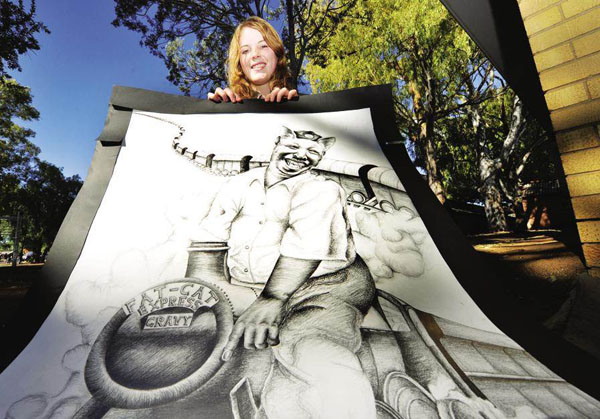 At least it seems the future leadership of the ANC is getting some training in dealing with awkward art-related stories of their own. Bloemfontein student Alta Bonnet (17) was told her painting depicting former ANC Youth leader Julius Malema ‘as a fat cat on a gravy train’ might not be exhibited at a city art show. The picture was deemed ‘too political’.
At least it seems the future leadership of the ANC is getting some training in dealing with awkward art-related stories of their own. Bloemfontein student Alta Bonnet (17) was told her painting depicting former ANC Youth leader Julius Malema ‘as a fat cat on a gravy train’ might not be exhibited at a city art show. The picture was deemed ‘too political’.
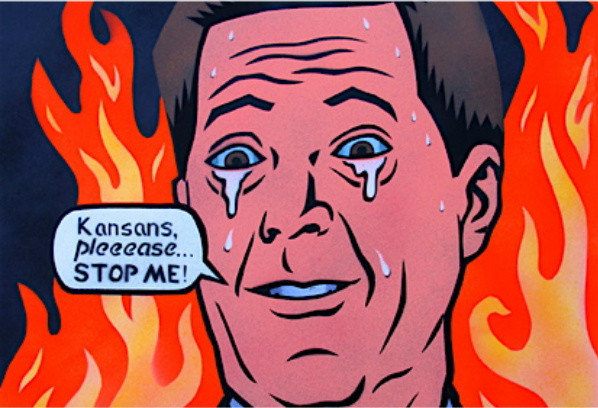 Kansas artist Dave Loewenstein last year had his picture of Governor Sam Brownback removed from a cafe in the state’s capital Topeka. The picture is a cartoon depiction of the governor, with the words ‘REJECT BROWNBACK’ printed on. Loewenstein said the picture was in protest at Brownback’s policies and not him personally. Greg Ready, the landlord of the building, said they had chosen to remove the painting because Brownback’s daughter worked at the cafe in question, adding ‘there was no political motivation for this action whatsoever.’
Kansas artist Dave Loewenstein last year had his picture of Governor Sam Brownback removed from a cafe in the state’s capital Topeka. The picture is a cartoon depiction of the governor, with the words ‘REJECT BROWNBACK’ printed on. Loewenstein said the picture was in protest at Brownback’s policies and not him personally. Greg Ready, the landlord of the building, said they had chosen to remove the painting because Brownback’s daughter worked at the cafe in question, adding ‘there was no political motivation for this action whatsoever.’
But you could understand Brownback being a little thin skinned – this wasn’t the first time he had been viciously attacked. In 2011, when his office took note of a tweet by High School student Emma Sullivan (18), her principal demanded she write an apology letter to the governor. The tweet? “Just made mean comments at gov. brownback and told him he sucked, in person (hash)heblowsalot.” Scathing.
Have we missed any? Let us know in the comments!
5 Sep 2013 | Comment, News and features, United Kingdom

A troll, yesterday
Law firm Schillings has relaunched as a privacy and cyber security firm, the Lawyer reports.
Schillings, scourge of many a Fleet Street editor, clearly believes the future of libel and privacy lays online. As such, they have co-opted online security firm “Vigilante Bespoke” into “Schillings IT Security”.
Vigilante Bespoke (which wouldn’t be a bad rapper name) started in 2009 as an “ethical hacking” business, testing gaps in firms and individual’s technological security.
Now, Vigilante Bespoke founder Oliver Crofton is being cast by Schillings as the Trollhunter General. He explains on the Schillings site:
“Although the internet is seen by some as anonymous, everything we do online leaves a “digital fingerprint”, which in some instances can be traced to uncover valuable identifying information.
“During investigations we look to uncover IP addresses (these are unique codes that relate to an individual home or office internet connection), which can often lead us to the street address of the person posting the nasty comments. In some instances, website server connection logs can be analysed, which can give us the mac address (a computer’s name and location) of the computer being used to post the unsolicited content.
“Simple tools also help when tracing people online, such as indepth online searches for usernames; as these are often used across several websites and each website may vary in the amount of information available about their users.”
Apart from troll hunting, the Schillings site has lots more to say on social media: what does a company do, for example, when compromising pictures of senior figures are Instagrammed (“the Weiner Dilemma” perhaps?). How to deal with negative customer reviews on say, TripAdvisor, or how to handle an ex-employee who can’t stop ranting about your company online?
The Schillings site is, in its own way, an indicator of where the new libel and privacy battles will be fought. It’s not about newspapers any more.
(ht Leah Borromeo)
4 Sep 2013 | News and features, United Kingdom
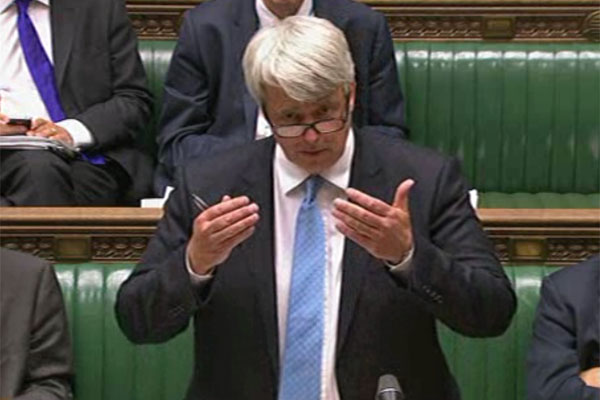 The controversial Transparency of Lobbying, Non-party Campaigning and Trade Union Administration Bill yesterday passed its second reading. The legislation includes a proposal to cap the spending of charities in election years which has been widely criticised, earning it the nickname “the gagging bill”.
The controversial Transparency of Lobbying, Non-party Campaigning and Trade Union Administration Bill yesterday passed its second reading. The legislation includes a proposal to cap the spending of charities in election years which has been widely criticised, earning it the nickname “the gagging bill”.
Despite the bill passing its second reading by 309 votes to 247, Sky News reported that “the comfortable margin masked significant opposition across parties.”
The Guardian provides a rundown of the key questions related to the bill, including the cause of the controversy: “Charities are unhappy that their political campaigning could fall under restrictions for the first time. Legal advice obtained by the National Council of Voluntary Organisations said it could have a chilling effect. Helen Mountfield QC warns of uncertainty about what the bill means by ‘for political purpose’, saying it could ‘put small organisations and their trustees/directors in fear of ‘criminal penalty if they speak out on matters of public interest and concern’.”
A near-united NGO sector has slammed the proposal. “The Lobbying Bill represents a real threat both to the quality of debate on public policy in this country and charities’ ability to champion the needs of the poor and vulnerable through campaigns such as Make Poverty History,” said Oxfam.
‘What began as a bid to clean up politics and make the process more transparent has ended up as an attempt to restrict people and individuals engaging in politics and exercising their democratic rights of free speech,’ said anti-fascist group HOPE not Hate.
‘The government’s rushing through a new law which, if it passes, will stop us running the type of campaigns which have made us who we are during the year leading up to elections. Put simply, the new rules will make it almost impossible for campaign groups, charities and others to campaign in the way we do during the year before elections,’ said 38degrees.
The National Council for Voluntary Organisations have now written to Chloe Smith, the minister in charge of the bill, outlining their concerns. A coalition of conservative think tanks, including the Adam Smith Institute, Big Brother Watch, Centre for Policy Studies, Institute of Economic Affairs, Taxpayers Alliance have criticised the “significant failings” of the bill: “The lack of clarity in the legislation further exacerbates its complexity, while granting a remarkably broad discretion to the Electoral Commission. The potential tidal wave of bureaucracy could cripple even well-established organisations, while forcing groups to reconsider activity if there is a perceived risk of falling foul of the law. This self-censorship is an inevitable consequence of the bill as it stands.”
Moreover, the Electoral Commission have stated the bill raises “real questions around freedom of speech” reported The Independent. “There may be circumstances where we would need to ask someone to take down a blog or a website or stop a rally from happening. That is a significant intervention for the Electoral Commission to take. [But] the change to our remit does give us greater discretion. That gives us significant concerns.”
The bill has also come in for massive criticism from the opposition, with shadow Commons leader Angela Eagle dubbing it “one of the worst pieces of legislation I’ve seen any government produce in a very long time”, the BBC reported. “It’s a sop to powerful, vested interests; a sinister gag on democratic debate in the run-up to the general election; a shameful abuse of the legislative process to make cheap, partisan points. This is a very bad bill,” she adds.
Independent columnist Owen Jones argues the bill is undemocratic: “Warnings of threats to democracy should be sparingly issued: they contain the risk of undermining an argument through hyperbole, of making us numb to genuine menaces. But be under no illusions: the Government’s catchily titled Transparency of Lobbying, Non-Party Campaigning and Trade Union Administration Bill is an audacious stab at many of our hard-won democratic freedoms.”
Meanwhile, Conservative MP Douglas Carswell adds that the bill does little to tackle the problem of lobbying: ‘My main concern, however, is what is not in this Bill. Big corporate interests serious about changing public policy don’t mainly focus on Parliament. They go up the road to Whitehall. It is there that the nexus of influence between big corporate interests and big government lies. The Bill does little to change any of that, and fails to sort out the revolving door between big Whitehall departments and various vested interests. Who inputs directly into the civil servants as they draft policy and rules? Who has a quiet word with the new non-executives at the department? We do not know.’
Labour’s Stephen Doughty, in one of the more colourful addition to the Commons debate, stated that the bill has “whiff of Zimbabwe”.
Andrew Lansley, sponsor of the bill has defended it as tool for making “our democracy more accountable”: ‘The Transparency Bill has three key aims: to make it clear who is lobbying the Government and for whom; to make third-party campaigning at election times subject to clear rules; and to provide assurance that trade unions know who their members are.’
Chloe Smith also attempted to calm some of the charities’ fears: “At the 2010 General Election, very few charities were registered as third parties. Provided they continue to campaign as most of them always have – that is, they are not promoting the electoral success or otherwise enhancing the standing of parties/candidates – charities will not be affected by this legislation,” Smith added.
You can read a transcript of the Commons debate here , or watch it here from 12.47.





 In 2002,
In 2002, 



